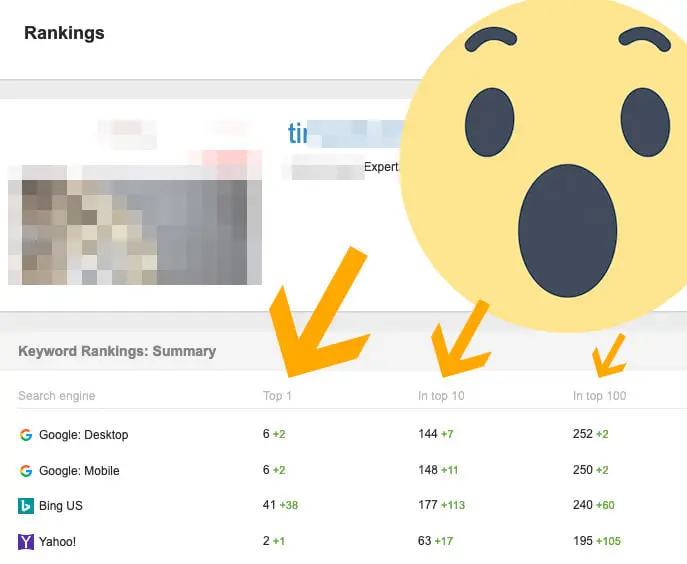Time flies. Well, except 2020. That took forever. With 2021 underway, let’s dig into trends shaping the search engine optimization (“SEO”) landscape, since SEO best practices change every year… or do they?
Spoiler alert: Not really.
With so much content published about Search Engine Optimization (“SEO”), many people aren’t sure what strategies are still relevant and what’s a waste of time. Let’s jump into 2021 marketing strategies, starting with demystifying popular myths and misconceptions of SEO.

SEO Myths
#1 – Myth: “Don’t you know who I am? I’m famous on social media!”
A lot of SEO’s will argue this first myth, which is cool. I know there are a million ways to approach SEO.
But my stance on social media influencing SEO?… doesn’t really exist.

The idea of social media being a ranking signal is that conversations are more organic on these platforms. At face value, that would make sense. However, two problems:
- A large amount of content on social media is gated. When your profile is set to private, or your post is marked for friends only, guess what, Google can’t see it.
- More importantly, because vanity metrics like follower count and likes can easily be manipulated and artificially inflated, the unique domain count matters more than the engagement count anyway.
- Million followers on Facebook? Still just one referring domain.
- Million retweets on Twitter? Still just one referring domain.
- Million Instagram followers? Still just one referring domain.
“But what about when content goes viral, Damon?” Great question.
When 10/10 drunk guy goes viral for dropping knowledge, does that mean his Facebook posts have more value than Wikipedia? No.
When Double Rainbow man wow’s your heart, will that help you find better camping gear than you’d find on REI’s website? No.
When Grumpy Cat goes viral on social media, does that mean his website has more cat food options than Chewy? No.
Does that mean you should give up on social media altogether? Definitely not. Although social media has its own benefits, it has little direct impact (if any) on search engine optimization.
#2 – Myth: Meta Keywords are rad!
Meta keyword tags (not the same as meta descriptions or other meta tags) were once an integral part of the SEO process. This line of text was used to signal to search engines what the page was about. Lengthy keyword lists were a common sight, stuffing this meta tag with every thinkable combination of a keyword that you wanted to rank for. They’d look something like this:
< meta name=”keyword” content=”keyword 1, keyword 2, keyword 3, keyword infinity” >
Unfortunately (or, fortunately), that excessive keyword stuffing brought the demise of this strategy. With meta keyword tags being abused continuously, Google went on record as far back as 2009 to state that their algorithms no longer factor in meta keywords.

#3 – Myth: You Need to Submit Your Website to Google
Nah, you don’t.
Long ago, you used to have to “submit your website to Google” for it to know that its beauty existed. However, Google has evolved to follow links from other websites and use different methods to find domains. So they announced in 2018 that the public URL submission tool would be retired. And Bing followed shortly after.
Why do we still see websites and get emails about submitting your site to Google then? Because it’s a scam tactic to make a quick buck off of you.
You can still help Google find new content quicker by submitting URLs to Google via Google Search Console, but submitting your domain for Google to know it exists, in general, is no longer needed.
#4 – Myth: Rankings Will Make or Break Your Success
Sure, rankings are an essential SEO metric, but they won’t determine your success alone. Afterall, who cares if you rank #1 for a Googlewhack? Rankings must translate into traffic, which must translate into sales.
#5 – Myth: SEO Is the Answer
Although SEO is powerful, it’s not a magic wand to instantly bring you customers in a matter of days or even months. Having covered myth #4, if a business is failing, it’s likely too late to implement SEO to turn its fortunes around.
Search engine optimization is a strategy that requires strategizing and time, often needing a runway of a year or more to drive results.
SEO Trends
“Great. Thanks, Damon. Now that we know what not to do, what CAN we do?”
#6 – Trend: Good User Experience (UX)
Last year, Google announced that it would be tweaking its search algorithm to focus on what it refers to as “Core Web Vitals.” Core Web Vitals are a set of metrics focused on the user experience. They measure things like site load time and mobile-friendliness, rewarding sites that deliver on those fronts with higher rankings.
The Core Vitals panic isn’t much different than Google’s 2015-16 Mobilegeddon. It’s the same old concept that your site should be accessible across all screens and devices for maximum usability. Plus, it should load fast – because most of your visitors won’t wait longer than three seconds for your website to load.
Want some easy wins to make your website load quicker for SEO benefit? Hit up GTmetrix.com. This free tool will help you identify what images are oversized so you can shrink them for quicker load, as well as what code may be bloated, slowing things down.
#7 – Trend: Long-Form Content
We’ve all heard it. “Put out good content frequently, because content is king…”

While consistent content is massively important, posting random 500-600-word blog posts is unlikely to give a boost to your rankings. For the best results, focus on quality. If I had the choice between posting 500 words “easy” articles weekly versus one or two 2,000 word, more researched posts monthly, gimme’ the 2k’er.
Posting four or five 500 word articles will take nearly the same amount of time as one or two well researched 2,000-word articles, but the nature of the other being more detailed and value-added = better SEO results.
BONUS: Longer form content means it takes longer for your visitors to read. Longer on-page reading = better bounce rate = better SEO rankings.
#8 – Trend: Strong external credibility
Backlinks, when another website links to your website, have long been a cornerstone of SEO. But all backlinks are not created equally. As you look for creative ways to get other websites to talk about you, remember that quality is more important than quantity… especially after Google’s 2012 “Penguin” algorithm update.
But allow me to contradict myself. As you focus on quality, don’t get too carried away. A lot of SEO’s focus on DA (Domain Authority) of websites, but too much so. “You need backlinks from hi DA sites, bro.”
According to Wikipedia, DA tries “to assess domain authority through automated analytic algorithms.” Sounds reasonable enough—only one problem. Google doesn’t use DA.
What’s the love over DA for then? It was birthed after Google removed PageRank (“PR,” a tool to rate websites reputation from 0-10) from Google Webmaster Tools in 2009 and stopped publicizing PR metrics in 2013. SEO’s that focused heavily on PR as a compass for a website’s quality needed a metric to replace PR. That’s when DA was born.
Why should you not go all-in on DA? Sure, in theory, high DA links sound nice. But if Wikipedia and Facebook are a DA 100, do you really think most sites are even in the same league? No.
Most websites are… average. This means that a non-100 DA of 5-40 is highly likely. This creates two unique considerations to think about.
- Finding other websites that are relevant to your industry (not just high DA) are less likely.
- Would you rather have a backlink from a high DA website in an irrelevant industry or an immediately relevant website with an average DA rank?
Yes, focus on quality, but it’s equally/more important to acquire backlinks from websites that are relevant to your industry.
#9 – Trend: Voice Search
Voice search is expected to multiply alongside the boom of mobile phone and smart speaker sales like Google Home and Amazon Echo. No surprises here. The outcome of this is a whole new range of keyword considerations for search engine optimization.
For instance, when you enter a question in search, you might unknowingly use broken sentences. We’ve been conditioned over the years to use as short, concise search phrases as possible. In contrast, voice searchers are more likely to ask questions as they would in a normal conversation.
However, the results from voice-initiated searched are still influenced by the same ol’ optimization tactics.
No webmasters are on the other side of the screen recording voice drops for Google to listen to and use for voice search results.
Instead, Google will show results for voice searches the same way it finds websites to show from text-based searches; websites that have the best answer, and Google could access the fastest (quick page speed), with good external credibility.
As you can see, 2021 is still mostly the same as 2020, which was similar to 2019. Well, at least from an SEO perspective. The rest of 2020, and even into 2021, is a circus. Be mindful of as you look to improve your Google rankings in this new year and future years.
Avoid shiny object syndrome, remember that the tortoise’s story versus the hare, and embrace delayed gratification. Slow and steady quality wins the race.